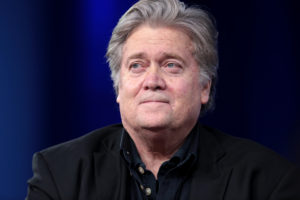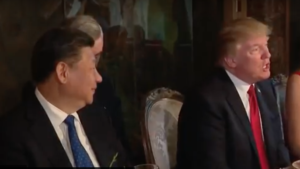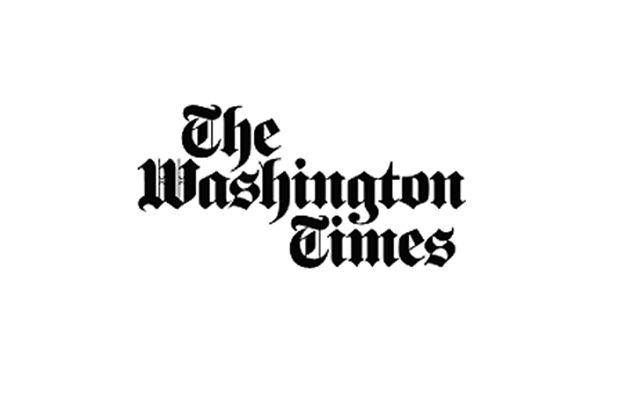
Daniel Lazare
Daniel Lazare is the author of ‘The Velvet Coup: The Constitution, the Supreme Court, and the Decline of American Democracy’ (Oct 2001); ‘America’s Undeclared War: What’s Killing Our Cities and How We Can Stop It’ (April 2001); and ‘The Frozen Republic: How the Constitution Is Paralyzing Democracy’ (June 1997). His articles on the history of right-wing nationalism in Ukraine can be found on the website of New Cold War.org, including: Who was Stepan Bandera? (Sept 2015) and Timothy Snyder’s Lies (June 2014).
Exclusive: The bigger picture behind Official Washington’s hysteria over Russia, Syria and North Korea is the image of a decaying but dangerous American hegemon resisting the start of a new multipolar order, explains Daniel Lazare.
By Daniel Lazare
The showdown with the Democratic People’s Republic of Korea is a seminal event that can only end in one of two ways: a nuclear exchange or a reconfiguration of the international order.
While complacency is always unwarranted, the first seems increasingly unlikely. As no less a global strategist than Steven Bannon observed about the possibility of a pre-emptive U.S. strike: "There’s no military solution. Forget it. Until somebody solves the part of the equation that shows me that ten million people in Seoul don’t die in the first 30 minutes from conventional weapons, I don’t know what you’re talking about. There’s no military solution here. They got us.”
This doesn’t mean that Donald Trump, Bannon’s ex-boss, couldn’t still do something rash. After all, this is a man who prides himself on being unpredictable in business negotiations, as historian William R. Polk, who worked for the Kennedy administration during the Cuban Missile Crisis, points out. So maybe Trump thinks it would be a swell idea to go a bit nuts on the DPRK.
But this is one of the good things about having a Deep State, the existence of which has been proved beyond a shadow of a doubt since the intelligence community declared war on Trump last November. While it prevents Trump from reaching a reasonable modus vivendi with Russia, it also means that the President is continually surrounded by generals, spooks, and other professionals who know the difference between real estate and nuclear war.
As ideologically fogbound as they may be, they can presumably be counted on to make sure that Trump does not plunge the world into Armageddon (named, by the way, for a Bronze Age city about 20 miles southeast of Haifa, Israel).
That leaves option number two: reconfiguration. The two people who know best about the subject are Russian President Vladimir Putin and Chinese President Xi Jinping. Both have been chafing for years under a new world order in which one nation gets to serve as judge, jury, and high executioner. This, of course, is the United States.
If the U.S. says that Moscow’s activities in the eastern Ukraine are illegitimate, then, as the world’s sole remaining "hyperpower,” it will see to it that Russia suffers accordingly. If China demands more of a say in Central Asia or the western Pacific, then right-thinking folks the world over will shake their heads sadly and accuse it of undermining international democracy, which is always synonymous with U.S. foreign policy.
There is no one – no institution – that Russia or China can appeal to in such circumstances because the U.S. is also in charge of the appellate division. It is the "indispensable nation” in the immortal words of Madeleine Albright, Secretary of State under Bill Clinton, because "we stand tall and we see further than other countries into the future.” Given such amazing brilliance, how can any other country possibly object?
Challenging the Rule-Maker
But now that a small and beleaguered state on the Korean peninsula is outmaneuvering the United States and forcing it to back off, the U.S. no longer seems so far-sighted. If North Korea really has checkmated the U.S., as Bannon says, then other states will want to do the same. The American hegemon will be revealed as an overweight 71-year-old man naked except for his bouffant hairdo.

Chief White House Strategist Steve Bannon speaking at the 2017 Conservative Political Action Conference (CPAC) in National Harbor, Maryland.
Not that the U.S. hasn’t suffered setbacks before. To the contrary, it was forced to accept the Castro regime following the Cuban Missile Crisis in 1962, and it suffered a massive defeat in Vietnam in 1975. But this time is different. Where both East and West were expected to parry and thrust during the Cold War, giving as good as they got, the U.S., as the global hegemon, must now do everything in its power to preserve its aura of invincibility.
Next to go was Mullah Omar of Afghanistan, sent packing in October 2001, followed by Slobodan Milosevic, hauled before an international tribunal in 2002; Saddam Hussein, executed in 2006, and Muammar Gaddafi, killed by a mob in 2011. For a while, the world really did seem like "Gunsmoke,” and the U.S. really did seem like Sheriff Matt Dillon.
But then came a few bumps in the road. The Obama administration cheered on a Nazi-spearheaded coup d’état in Kiev in early 2014 only to watch helplessly as Putin, under intense popular pressure, responded by detaching Crimea, which historically had been part of Russia and was home to the strategic Russian naval base at Sevastopol, and bringing it back into Russia.
The U.S. had done something similar six years earlier when it encouraged Kosovo to break away from Serbia. But, in regards to Ukraine, neocons invoked the 1938 Munich betrayal and compared the Crimea case to Hitler’s seizure of the Sudetenland.
Backed by Russia, Syrian President Bashar al-Assad dealt Washington another blow by driving U.S.-backed, pro-Al Qaeda forces out of East Aleppo in December 2016. Predictably, the Huffington Post compared the Syrian offensive to the fascist bombing of Guernica.
Fire and Fury
Finally, beginning in March, North Korea’s Kim Jong Un entered into a game of one-upmanship with Trump, firing ballistic missiles into the Sea of Japan, test-firing an ICBM that might be capable of hitting California, and then exploding a hydrogen warhead roughly eight times as powerful as the atomic bomb that leveled Hiroshima in 1945. When Trump vowed to respond "with fire, fury, and frankly power, the likes of which the world has never seen before,” Kim upped the ante by firing a missile over the northern Japanese island of Hokkaido.
As bizarre as Kim’s behavior can be at times, there is method to his madness. As Putin explained during the BRICS summit with Brazil, India, China, and South Africa, the DPRK’s "supreme leader” has seen how America destroyed Libya and Iraq and has therefore concluded that a nuclear delivery system is the only surefire guarantee against U.S. invasion.
"We all remember what happened with Iraq and Saddam Hussein,” he said. "His children were killed, I think his grandson was shot, the whole country was destroyed and Saddam Hussein was hanged…. We all know how this happened and people in North Korea remember well what happened in Iraq…. They will eat grass but will not stop their nuclear program as long as they do not feel safe.”
Since Kim’s actions are ultimately defensive in nature, the logical solution would be for the U.S. to pull back and enter into negotiations. But Trump, desperate to save face, quickly ruled it out. "Talking is not the answer!” he tweeted. Yet the result of such bluster is only to make America seem more helpless than ever.
Although The New York Times wrote that U.S. pressure to cut off North Korean oil supplies has put China "in a tight spot,” this was nothing more than whistling past the graveyard. There is no reason to think that Xi is the least bit uncomfortable. To the contrary, he is no doubt enjoying himself immensely as he watches America paint itself into yet another corner.
The U.S. Corner
If Trump backs down at this point, the U.S. standing in the region will suffer while China’s will be correspondingly enhanced. On the other hand, if Trump does something rash, it will be a golden opportunity for Beijing, Moscow, or both to step in as peacemakers. Japan and South Korea will have no choice but to recognize that there are now three arbiters in the region instead of just one while other countries – the Philippines, Indonesia, and maybe even Australia and New Zealand – will have to follow suit.

President Donald Trump welcomes Chinese President Xi Jinping to a state dinner during their summit at Mar-a-Lago, Florida, on April 6, 2017. (Screen shot from whitehouse.gov)
Unipolarity will slink off to the sidelines while multilateralism takes center stage. Given that U.S. share of global GDP has fallen by better than 20 percent since 1989, a retreat is inevitable. America has tried to compensate by making maximum use of its military and political advantages. That would be a losing proposition even if it had the most brilliant leadership in the world. Yet it doesn’t. Instead, it has a President who is an international laughingstock, a dysfunctional Congress, and a foreign-policy establishment lost in a neocon dream world. As a consequence, retreat is turning into a disorderly rout.
Assuming a mushroom cloud doesn’t go up over Los Angeles, the world is going to be a very different place coming out of the Korean crisis than when it went in. Of course, if a mushroom cloud does go up, it will be even more so.





_jpg/250px-ElbeDay1945_(NARA_ww2-121).jpg)








